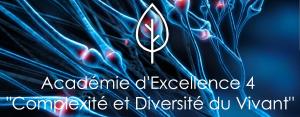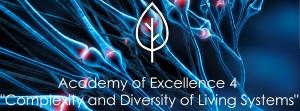Académie d'Excellence "Complexité et diversité du vivant"
Rentrée 2021 de L'Académie 4 : Stages Master Interdisciplinaires, Dr BOISSON-DERNIER & Plateformes de Spectrométrie de Masse d'Université Côte d'Azur
- Recherche
- IDEX
- Formation
- International
le 1 octobre 2021
Ouvert à tous sur inscriptions gratuites mais obligatoires.

Retour en images sur la journée !
Au Programme :
-Présentations par les porteurs des 5 projets de Stages Environnés de Master en Binômes Interdisciplinaires sélectionnés pour financement le 21 juin dernier par l'académie 4.
-Présentation d'une nouvelle équipe de Recherche dirigée par Aurélien BOISSON-DERNIER dont l'installation sera co-financée par l'Académie 4.
-Présentations des 4 plateformes de Spectrométrie de Masse d’Université Côte d’Azur.
9h30 - Accueil - Le mot du Coordinateur de l'Académie 4 Dr Pascal BARBRY.
PRESENTATIONS par les porteurs des 5 projets de Stages Environnés de Master en Binômes Interdisciplinaires sélectionnés pour financement le 21 juin 2021 par l'académie 4 (Action 1 de l'Académie 4).
9h45 : Introduction - Dr Bruno ANTONNY (Président du Conseil Scientifique de l'Académie 4)
10h00
Projet 2021_1 : Kill_HIF - A novel antagonist of HIF-1alpha to target cancer.
Dr Nathalie MAZURE, mazure@unice.fr, DR2 CNRS / Biologie / INSERM U1065, C3M / 1 Master.
Dr Mohamed MEHIRI, Mohamed.mehiri@univ-cotedazur.fr, MCU HDR / Chimie / ICN / 1 Master.
Frédéric BOST.
Mots clés : Cancer, Inhibiteur, HIF-1, Hypoxie, Substances naturelles marines.
10h15
Projet 2021_2 : RNP_IMAGE - Developing methodologies to quantitatively analyze RNP granule dynamic properties upon aging.
Dr Florence BESSE, Florence.besse@univ-cotedazur.fr / Biologie / iBV / 1 Master.
Dr Xavier DESCOMBES, xavier.descombes@inria.fr / Informatique / INRIA / 1 Master.
Fabienne DE GRAEVE & Eric DEBREUVE.
Mots clés : biological condensates, RNP granules, high-resolution live imaging, automatic object detection, quantitative image analysis.
10h30
Projet 2021_4 : Chemi_RNP - Optimisation de composés chimiques ciblant les granules à ARN.
Dr Patrick BREST, patrick.brest@univ-cotedazur.fr / CRCN INSERM / Biologie / IRCAN / 1 Master.
Dr Maria DUCA, maria.duca@univ-cotedazur.fr / CRCN CNRS / Chimie / ICN / 1 Master.
NICOLINI Victoria, JACQUET Karine & Di Giorgio Audrey.
Mots clés : Granules à ARN, Processing bodies, ribonucléoproteine, criblage chimique.
10h45
Projet 2021_5 : PROoF - Comment protéger les forêts marines Méditerranéennes des poissons herbivores ? (PROtection of marine forests from herbivorous Fishes).
Dr Luisa PASSERON-MANGIALAJO, Luisa.PASSERON-MANGIALAJO@univ-cotedazur.fr / MCF HC HDR / Ecologie fonctionnelle / ECOSEAS / 1 Master.
Dr Nathalie LAZARIC, Nathalie.LAZARIC@univcotedazur.fr / DR CNRS / Economie / GREDEG / 1 Master.
Cécile SABOURAULT & Mohamed MEHIRI.
Mots clés : forêts marines, poissons herbivores, écologie chimique, changements de comportements des consommateurs, valorisation économique, gouvernance des écosystèmes, biens communs.
11h00
Projet 2021_6 : AmpFluo3D - Solution innovante d’AMPlification de la FLUOrescence appliquée à la détection de marqueurs sur cultures cellulaires tridimensionnelles.
Dr Frédéric BRAU, brau@ipmc.cnrs.fr / IR HC CNRS / Biologie / IPMC / 1 Master.
Dr Tatiana BUDTOVA, tatiana.budtova@mines-paristech.fr DR / Physiques / Mines ParisTech / 1 Master.
LIPPI Gian Luca & LUTON Frédéric.
Mots clés : Imagerie cellulaire, Culture 3D, Bio-aérogels, Polysaccharides, diffusion de la lumière, Fluorescence.
KEYNOTE SPEAKER : Présentation du projet de Recherches d'une Equipe nouvellement installée sur le site d’Université Côte d’Azur (Action 2 de l'Académie 4).
11h30 – Introduction du coordinateur de l’Académie 4, Dr Pierre ABAD.
11h35
"Cell wall Integrity mechanisms and growth control in plants."
Dr Aurélien BOISSON-DERNIER, aboisson@uni-koeln.de, Group Leader Institut Sophia Agrobiotech, INRAE.
From the Botanical Institute, Cologne Biocenter, University of Cologne, Germany.
Google Scholar: https://goo.gl/s5Aoq0
Former lab website: http://www.ag-boisson-dernier.botanik.uni-koeln.de/
Abstract : Plant cells are shielded from their environment by a rigid, yet flexible barrier, the cell wall (CW) that contains the high intracellular turgor pressure. When plant cells grow, they meet the challenge of having to loosen up their protective CW to allow for expansion, while at the same time ensuring that it does not break. To overcome this challenge, the growing cell must adapt to any environmental challenges modifying its CW properties so as avoid growth arrest or cell rupture. In nature, these growth accidents are very rare as plant cells have developed robust and complex CW integrity mechanisms that coordinate CW performance with their internal growth machinery. While acute understanding of CW integrity mechanisms remains scarce, loss of such mechanisms has been shown to dramatically impact plant health impairing development, sexual reproduction, hormone homeostasis, response to abiotic stresses and interactions with microorganisms. Thus, studying and understanding CW integrity pathways are of fundamental importance for plant biology and for improving plant health in a changing environment.
Due to their fundamental agronomic importance for seed formation, water absorption and nutrients uptake as well as their model system characteristics, my group has studied in the flowering plant model Arabidopsis thaliana, CW integrity mechanisms in pollen tubes and root hairs that both elongate rapidly by tip-growth. We will first discuss how, in these fast-growing cells, the CW integrity mechanisms are regulated by Malectin-like Receptor (MLRs) in cooperation with their extracellular ligands, the Rapid Alkalinization Factors (RALFs). Moreover, through an interdisciplinary approach that includes molecular and cell biology, forward and reverse genetics, CW biology, and trans-species complementation, we will show how similar these pathways are from the one that controls the tip-growth of rhizoids, an ancient rooting structure found in descendants of the earliest land plants. Finally, within the frame of our fresh installation at Institute Sophia Agrobiotech in partnership with Université Côte d'Azur, we will briefly discuss how CW integrity mechanisms that govern plant development can constitute preferential targets for pathogens to corrupt host cell physiology and establish disease and how this subversion could potentially be prevented.
12h30 - Pause Déjeuner - Paniers collations individuels offerts aux orateurs de la journée par l'Académie 4.
PRESENTATIONS des 4 plateformes de spectrométrie de masse d’Université Côte d’Azur (Action 4 de l'Académie 4).
14h00
Dr Marc GAYSINSKI, Plateforme Technologique de Chimie, ICN Université Côte d'Azur.
"Obtention de bio résine thermodurcissable à partir d’humins, un produit secondaire issu des Processus de bio-raffinage".
Fiche MarcGAYSINSKI_Plateforme_ICN_UCAJEDI
14h30
Dr Delphine DEBAYLE, Plateforme d'Analyses de Biomolécules, IPMC CNRS.
"La plateforme d’analyse des biomolécules de l’IPMC, savoir-faire et expertise : présentation d’un exemple d’application en analyse lipidomique."
Fiche DelphineDEBAYLE_Plateforme_IPMC_CNRS
15h00
Aurélie SEASSAU, Plateforme de biochimie analytique, ISA INRAE.
"Importance des métabolites secondaires en santé des plantes: une diversité des modèles et un challenge technologique."
Fiche AurélieSEASSAU_Plateforme_ISA_INRAE
15h30
Dr Jean-Marie GUIGONIS, Plateforme Bernard ROSSI, TIRO-MATOs CHU NICE.
"Approche non ciblée en métabolomique clinique par LC/MS/MS Haute Résolution sur la plateforme Bernard ROSSI Faculté de Médecine de Nice."
Fiche JeanMarieGUIGONIS_Plateforme_TIRO-MATOs_CHUNICE
16h00
Table ronde "Questions Discusions Conclusions" modérée par Dr Bruno ANTONNY et les responsables des plateformes.
Ouvert à tous sur inscriptions gratuites mais obligatoires.



















